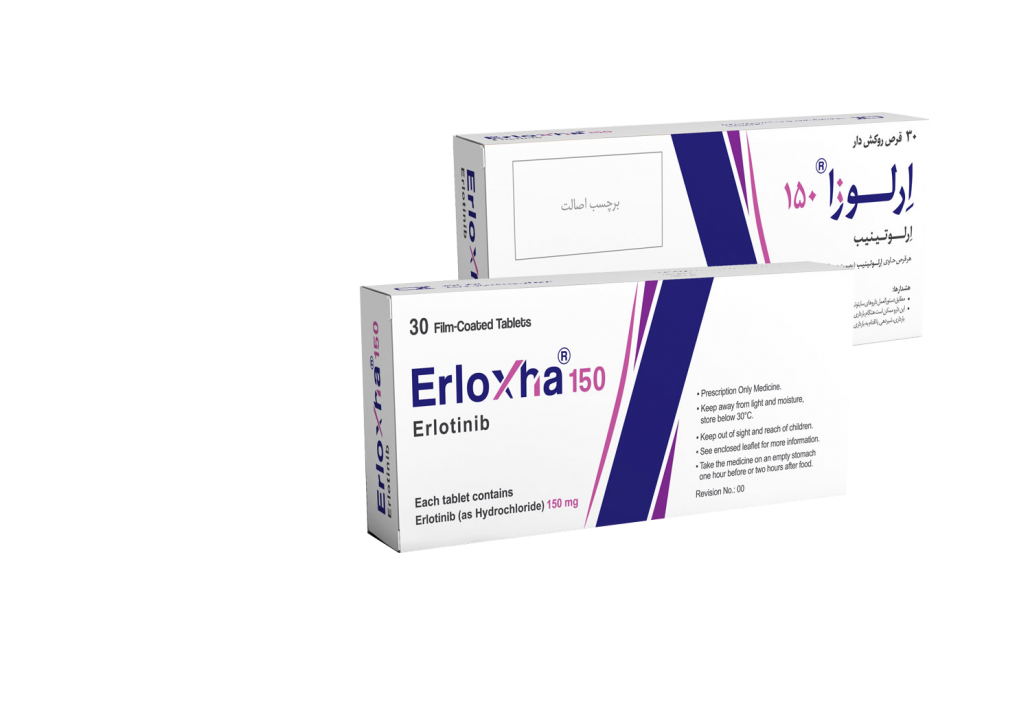1- What is Erloxha®?
Erloxha® contains active ingredient erlotinib (as hydrochloride). FDA approved erlotinib in 2004.
2- Mechanism of Action
Erlotinib is a receptor tyrosine kinase inhibitor which acts on the epidermal growth factor receptor (EGFR).This protein plays a role in growth and metastases of cancer cells in body.
3- Indications and Usage
Erlotinib is used in:
- First-line treatment of metastatic lung cancer (NSCLC; Non-small cell lung cancer), maintenance treatment or after failure of prior chemotherapy regimen.
- First-line treatment of patients with locally advanced, unresectable or metastatic pancreatic cancer (in combination with gemcitabine)
4- Dosage and Administration
¤ Non-small cell lung cancer (NSCLC): The recommended daily dose of Erlotinib is 150 mg.
¤ Pancreatic cancer: The recommended daily dose of Erlotinib is 100 mg, in combination with gemcitabine.
Erloxha® should be taken on an empty stomach an hour before or two hours after a meal every day at a regular time. For patients unable to swallow whole, tablets may be dissolved in 100 mL water and administered orally or via feeding tube (silicone-based); administer immediately after preparation. Respiratory and eye/face protection by using facial masks and gloves are recommended.
Dosage adjustment:
a- Concomitant CYP inhibitors/inducers:
– CYP3A4 inhibitors (strong): Avoid concurrent use if possible; reduce erlotinib dose for severe adverse reactions if erlotinib is administered concomitantly with strong CYP3A4 inhibitors. Dose reduction should be done in decrements of 50 mg (after toxicity has resolved to baseline or ≤ grade 1).
– Concomitant CYP3A4 and CYP1A2 inhibitor (e.g., ciprofloxacin): Avoid concurrent use if possible; if concomitant use cannot be avoided, reduce dose in decrements of 50 mg if severe adverse reactions occur (after toxicity has resolved to baseline or ≤ grade 1).
– CYP3A4 inducers: Avoid concurrent use if possible; if concomitant administration with CYP3A4 inducers cannot be avoided, increase erlotinib dose in 50 mg increments at 2-week intervals to a maximum of 450 mg; reduce erlotinib dose to recommended starting dose when CYP3A4 inducer is discontinued.
– CYP1A2 inducers: Avoid concurrent moderate CYP1A2 inducers if possible. If unavoidable, increase dose at 2-week intervals in 50 mg increments to a maximum dose of 300 mg (with careful
monitoring); immediately reduce erlotinib dose to recommended starting dose (based on indication) upon discontinuation of the moderate CYP1A2 inducer.
b- Dosage adjustment for concomitant smoking:
Avoid tobacco smoking if possible. If unavoidable, increase dose at 2- week intervals in 50 mg increments to a maximum dose of 300 mg (with careful monitoring); immediately reduce erlotinib dose to recommended starting dose (based on indication) upon smoking cessation.
5- Dosage Form and Strength
Erloxha® is available in film-coated tablets of 150 mg for oral use.
6- Warnings and Precautions
Pulmonary Toxicity
In erlotinib studies, there have been reports of Interstitial Lung Disease (ILD) that in very rare cases proved to be fatal. In the event of a new or progressive unexplained symptoms like shortness of breath (dyspnea), cough and fever, temporarily interrupt using the drug, and if ILD is diagnosed, permanently discontinue using it.
Kidney (Renal) Disorders/Failure
Cases of acute renal failure, renal insufficiency and hepatorenal syndrome have been reported. Monitoring renal function and serum electrolytes in patients at risk of dehydration is recommended.
Use of Erloxha in patients with severe renal impairment is not recommended.
Liver Toxicity (Hepatotoxicity)
Cases of severe hepatic failure and hepatorenal syndrome have been reported. Periodic liver function testing is recommended. In the setting of changes in liver function tests, dose reduction, temporarily interrupting or permanently discontinuing the medicine may be considered.
Gastrointestinal Disorders
There have been very rare reports of gastrointestinal perforation in patients taking erlotinib. Patients receiving concomitant corticosteroids, NSAIDS, Taxane-based chemotherapy and patients with a prior history of peptic ulcers are at increased risk. In such cases it is recommended to permanently discontinue using the drug.
Skin Disorders
Blistering and exfoliating skin conditions have been reported in some cases. Skin rashes especially in face, body and upper part of the chest are very common and can be controlled with common skin remedies. In case of severe allergic skin reactions, interrupt the dosage or permanently discontinue taking it.
Blood Disorders (Potential Bleeding)
There have been reports of microangiopathic hemolytic anemia with thrombocytopenia in patients receiving erlotinib and gemcitabine concurrently. Patients taking warfarin or other coumarin-derivative anticoagulants should be monitored regularly for changes in prothrombin time (PT) or INR and potential bleeding.
Ocular Disorders
Cases of corneal ulceration, dry eye, abnormal eyelash growth and keratitis have been reported. Interrupt or permanently discontinue therapy if patients present with eye pain, acute or worsening ocular disorders. Examining the eyes at the start of treatment and 4 to 8 weeks after that are recommended.
Lactose Intolerance
Since this drug contains lactose monohydrate, tell your doctor if you are lactose intolerant.
7- Adverse Effects
- Common (more than 10% of patient population)
* Cardiovascular: Thrombosis, Edema
* Central Nervous System: Fatigue, Depression, Confusion, Headache, Anxiety
* Skin Disorders: Skin Rash, Hair Fall
* Gastrointestinal: Diarrhea, Appetite Loss, Nausea, Vomiting, Dry Mucus, Indigestion, Abdominal Pain, Bloating
* Infection: More Susceptibility to Infection
* Cerebrovascular: Muscular Debility, Neuropathy, Muscle Pains
* Respiratory: Cough, Dyspnea
8- Drug Interactions
*Erlotinib may interact with other drugs such as omeprazole, some antibiotics, aspirin, etc. Be sure to inform your doctor of the medication list you used before starting erlotinib.
Some drug interactions can be pointed out as follows: (Caution should be observed when these active substances are combined with erlotinib.)
– CYP3A4 inhibitors (such as Ketoconazole, Clarithromycin, Erythromycin and Ciprofloxacin) may increase erlotinib plasma concentration;
– CYP3A4 inducers (such as Rifampicin, St. John’s Wort (hypericum perforatum)) may decrease erlotinib plasma concentration.
– CYP1A2 inhibitors (such as ciprofloxacin and Fluvoxamine) may increase erlotinib plasma concentration. Caution should be exercised when ciprofloxacin or potent CYP1A2 inhibitors (e.g. fluvoxamine) are combined with erlotinib. If adverse reactions related to erlotinib are observed, the dose of erlotinib may be reduced.
– Since solubility of erlotinib is acid dependent, drugs that alter
the pH of the upper GI tract may alter the solubility of erlotinib and reduce its bioavailability. To this effect, co-administration of erlotinib with proton pump inhibitors (antacids) should be avoided. If an antacid is necessary, the antacid dose and erlotinib dose should be separated by several hours.
* Avoid taking erlotinib with grapefruit and/or grapefruit juice as it may increase erlotinib level (plasma concentration) and cause adverse effects.
* Smoking
Cigarette smoking has been shown to reduce erlotinib plasma concentration. You should avoid smoking while taking erlotinib and inform your doctor accordingly.
9- Use in Specific Populations
Always consult your doctor or healthcare specialist for medical advice in relation to drug use while pregnant or breastfeeding.
– Pregnancy
Erlotinib may cause embryo/fetal lethality in pregnant women. To this effect, women are advised to avoid pregnancy while taking Erlotinib.
– Breast-Feeding
The excretion of erlotinib into mother milk is still not completely clear. To this effect and due to possible adverse effects in infants, nursing while taking erlotinib and two weeks after the last dose is not recommended.
– Pediatric use
The safety and efficacy of erlotinib in pediatric patients have not still been established.
– Patients with liver disorders
Caution should be used when administering erlotinib to patients with hepatic impairment. Dose reduction or interruption of erlotinib should be considered if severe adverse reactions occur.
The safety and efficacy of erlotinib has not been studied in patients with severe hepatic dysfunction (AST/SGOT and ALT/SGPT> 5 x ULN). Use of Erlotinib in patients with severe hepatic dysfunction is not recommended.
– Kidney Disorders
Less than 9% of a single dose of erlotinib is excreted in the urine, but in general no clinical studies have been conducted in patients with kidney disorders.
10- Overdose
In case of an overdose, contact healthcare providers or poison control centers so that necessary measures to monitor signs and symptoms are taken.
11- Missed Dose
In case you forget taking your dose, immediately take it as soon as you remember. Do not take the missed dose if it is almost the time to take the next dose and take your daily dose according to the given schedule.
12- Storage and Handling
*Keep away from light and moisture, store below 30°C.
*Erloxha® should be stored, transported and disposed of according to instructions for the safe handling of cytotoxic drugs.
*Keep out of reach and sight of children.
13- D.Nurse-Patient Helpline Team
You can contact Drugs Expert Consultation Center at 0935 220 3041-4 to get answers to your inquiries and also get to know nursing support centers in your city.Expert Consultation Center is always ready to answer the questions of our valued customers.



